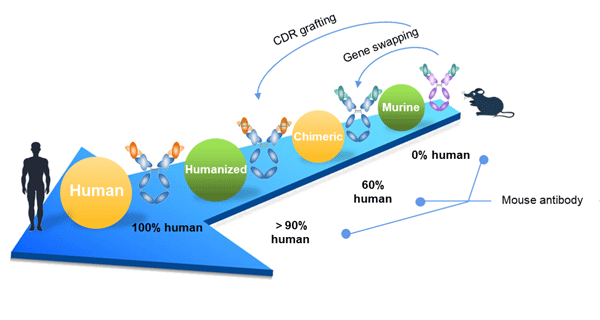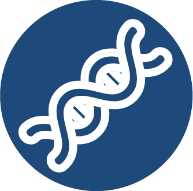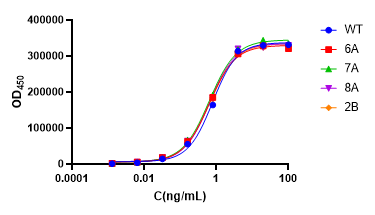Antibody Humanization
The entry of non-human-derived antibodies into the human body can cause serious rejection of the organism, which in turn affects the safety and therapeutic efficacy of the antibody in clinical applications. Humanized antibodies are genetically modified so that murine antibodies have a structure similar to that of human antibodies, thus evading recognition by the immune system. Antibody humanization has undergone technological evolution from chimeric antibodies to CDR grafting and SDR grafting, aiming to overcome the immunogenicity of traditional murine antibodies while maintaining high affinity and high specificity binding ability, and has extremely promising applications in tumor therapy and other fields.

Based on the deep learning algorithm of artificial intelligence, DetaiBio's humanization service can obtain antibody sequences with high degree of humanization and low mutation energy by constructing antibody structure model, CDR grafting and back mutation, identifying key amino acids and humanization operation. During the humanization process, both heavy and light chains are involved in the optimization, and the obtained heavy and light chains do not need to be combined for subsequent expression; antibodies from multiple species can be humanized to ensure that the degree of humanization of the V region of the delivered sequence is greater than 85%, and the overall degree of humanization of the FV region is greater than 90%, ensuring that the affinity of the delivered humanized antibody is comparable to that of the initial antibody.
Service Features
Heavy and light chains
simultaneously
participate in
optimization
Modified antibodies'
degree of
humanization>90%
Affinity of the humanized
antibody is comparable
to the initial antibody
Multiple
species’antibody
can be huamnized
Procedure

Workflow
| Stage | Service | Timeline | Deliverables |
|---|
| Design of Humanized Antibody | - Antibody structural model construction
- CDR grafting & back mutation
- Key Amino Acid Identify
- Ranking based on the degree of humanization and mutation energy
| 3 weeks | - 5 candidates sequences (at least one clone with affinity comparable to the initial antibody)
- 1mg purified antibody for 1 chosen clone
- Humanization design report
- Antibody activity assay report
- CoA
|
| Candidates Expression | - Gene Synthesis & Plasmid Construction
- Antibody Expression
|
| Candidates Activity Assay | - ELISA assay
- FACS assay
- Affinity Ranking
| 2 weeks |
| Humanized Antibody Expression & Purification | - Antibody Expression
- Purification without endotoxin
| 1 week |
|
Cases
The humanized antibodies (6A, 7A, 8A, 2B) were found to have comparable affinity to the initial mouse-derived antibody (WT) by ELISA and FACS activity assay.
Related Service
Related Resource










